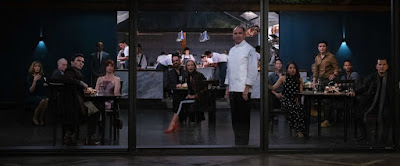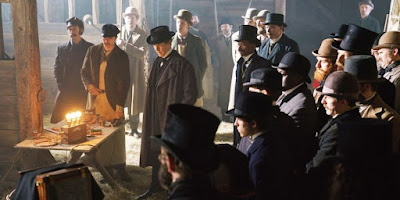"1-A!1-A!1-A!1-A! 1-A!"
So, what does a Superman movie written and directed by James Gunn (The Guardians of the Galaxy, THE Suicide Squad) look like?
Well, it's different. Uncomfortably so. But, that's not necessarily a bad thing. A roller-coaster ride from start to finish, Gunn manages to channel the 'Big Blue Boy Scout" aspects of the character that has always been a part of it—but, without the Hollywood temptations to mock them, contemplating "Bad Superman" or the brooding "misunderstood Christ-like alien" of the past films (complete with a lazily slavish devotion to the 1978 Christopher Reeve film—although this one does have a couple character call-backs from it...and the marchable John Williams theme)—while also dusting off some cliches, tossing others, and embracing some of the bizarre aspects that lie deep in the character-archives of the extended DC Comics Universe.
Gunn likes the bizarre. He cherishes it. What others might find childish and puerile, he uses with giddy delight. And Superman (2025) leaps into all that in a single bound. Well, actually, too many bounds to count. It's a dense movie that will leave many in the dust, but doesn't take itself so seriously...or iconically...that some of the details don't matter much. Not when you're dealing with sci-fi tech and concepts that verge into "woo-woo" territory almost constantly. Pocket Universes? Check. Manufactured black holes? Okay. Unexplained and unexplainable kaiju? Sure. Getting insurance for anything in the city of Metropolis? Okay, that one's a bit much, with all the mayhem that's tossed at the beleaguered city every few minutes in this film.Gunn tosses out the destruction of Krypton—how many times have we seen it?—but keeps the red trunks because...the red trunks embarrassed other film-makers...but embraces the tendency of creating mass-destruction set-pieces. There is a scene deep in the film where Supes and Lois Lane are having a heart to heart, while in the far background, members of the "Justice Gang" are battling a "dimensional imp" with clubs and green-energy baseball bats. It's a risk that the serious conversation will be overwhelmed by the goofy action in the background. But, it's also a salve about things getting too grim 'n gritty...this time.Who are this "Justice Gang"(not to be confused with the "Justice League")? Well, it's a little "inside baseball", but, here goes—they're Earth Green Lantern Guy Gardner (Nathan Fillion)—in the comics, this sector of space has 3—Mr. Terrific (Edi Gathegi), a scientific genius who actually has ethics, and Hawkgirl (Isabela Merced), whose origin story has had so many complications even DC comics hasn't decided what it is. Anyway, they're a weird choice for a super-team—but, director Gunn likes weird and even preposterous. But, they're in marked contrast to Superman: these guys want action. In an earlier kaiju fight, "The Gang" want to just kill it; Superman wants to put in an Intergalactic Zoo. He's in marked contrast to the "grim n' gritty" and adrenaline-junkies that mark most superhero movies. It's a stark contrast from the Zack Snyder/Christopher Nolan films. But, then, Supes' himself is a stark contrast.Gunn starts the movie in media res...no back-story, no explosive origin...with Superman suffering "his first defeat", falling into an Antarctic snowscape after being uppercut by "The Hammer of Moravia", a mecha-Hulk villain out of an autocratic country with a history of invading countries. Evidently, it's pay-back for Supes interfering with one of those invasions. He thought it the proverbial "right thing to do," but when interviewed by Daily Planet reporter Lois Lane (Rachel Brosnahan—she's great!), he is flummoxed when he is accused of an illegal act, not sanctioned by the U.S. government. Politics doesn't play into the Kryptonian's thinking, nor does race, color, or creed...like it has since the character's first publishing in 1938. He has human values, raised by as rural a couple (Pruitt Taylor Vince and Neva Howell) as you can imagine, but who have the moral fiber and strength to raise a kid who could fry their entire farm with an angry look, But doesn't. More importantly, wouldn't.
Who's behind the daily slings and arrows Superman has to deflect when he could be doing something else? Why, Lex Luthor (Nicholas Hoult, at full arrogance-mode), of course—maybe the movie people haven't read enough Superman comics...he has other enemies, but they seem to be stuck on Luthor the same way the Batman movies are stuck on The Joker—but, he's back to being a scientific genius (albeit a sloppy one) and tech-bro...not a crooked real estate developer this time...who hates the Kryptonian with a passion ("Super...'man'. He's not a man. He's an 'it'. A thing with a cocky grin
and a stupid outfit, that's somehow become the focal point of the entire
world's conversation.").
Lex wants the Kryptonian's reputation...and he wants his power. If he can't have them, no one will, so he either wants to tarnish Supes' image...or kill him. Because that's how you climb that ol' megalomaniacal ladder, not by winning hearts and minds, but by making people lose theirs.So, though it may still a very fantastical comic-book world in this one, it sure echoes our times...the way the comics version of Superman periodically does since his debut in 1938. Its a different world, where anybody could use their phones to film you changing clothes in a phone booth (if there WERE phone booths, and isn't that ironic?), where information, good, bad or indifferent, is faster than a speeding bullet. Where anybody with a grudge or a cause can, at the very least, bloviate like they're doing a TED talk. And lie through their teeth like they were telling Truth. More people have more access to the power of technology, but use it in the worst ways.
What differentiates Gunn's Superman from all the iterations that have come before is that he's a good guy despite the "powers and abilities far beyond those of mortal men." He knows he's an alien, but when given the old Nature versus Nurture question, he lands with a thud on the latter. He assimilates, and tries to be 110% human to compensate. He doesn't mope, he doesn't question his fate, he's not tempted to abuse his power or even be snarky about it. It's the old comic-book Superman, but without Warner Brothers messing with it to make the character "more hip" for "modern" audiences. Gunn keeps the character pure, but surrounds him with the goofy, the childish, the arrogant, and the just plain bad. To mark the contrast.Gunn leans into the humanity, but an outsider's view of it, seeing the good, the hope, the striving, and the yearning to be free and wanting to be that. I see an awful lot of internet blather about moments of "cringe" in this Superman, particularly this speech:
That is where you've always been wrong about me, Lex. I am as human as anyone. I love, I-I get scared. I wake up every morning, and despite not knowing what to do, I put one foot in front of the other, and I try to make the best choices that I can. I screw up all the time, but that is being human, and that's my greatest strength. And someday, I hope, for the sake of the world, you understand that it's yours too.
Good Lord. Maybe it's "cringe" because he admits he makes mistakes, but we could use a lot more of that these days, but that would take character, humility, honesty, and a whole lot of other things missing in this PR-saturated spin-zone we call a world.For a time now, I've been grousing (and boring friends) about certain notable politicians and corporate Masters of the Universe, by describing each one as an "Anti-Superman." Why? Superman (so the old TV show announced) "fights a never-ending battle for Truth, Justice, and the American Way." But, now its an every-day, non-prosecuted occurrence 180° in the other direction with these guys. There's no relationship with Truth (which has never been so degraded and discarded), Justice, which is consistently delayed and dismissed...and as for The American Way? It's the way of the thug-gangster, that icon of American pop-culture (until it affects us personally).
And common decency is becoming more and more uncommon.
No wonder the last Superman movies were so grim, gritty and stewed in their own existential juices so much. We don't need that kind of inspiration.
We need this Superman. A Superman who can push against a falling skyscraper, but also push against the inexorable fall of civilized behavior or civilization itself, and not break a sweat or crack with angst. And leads...by example...for the good. The common good.




















































